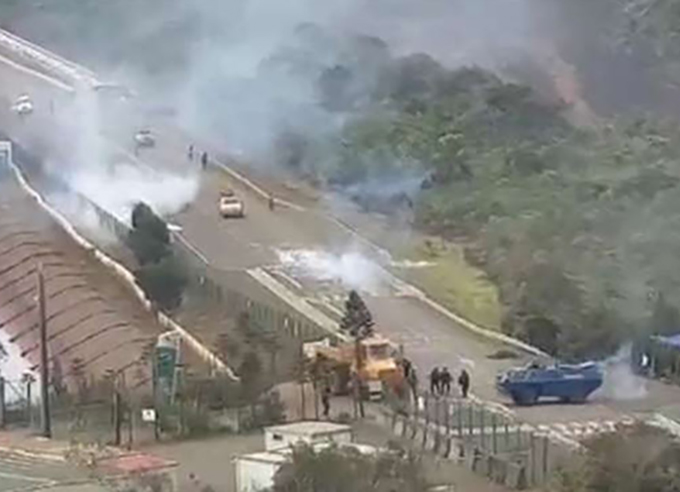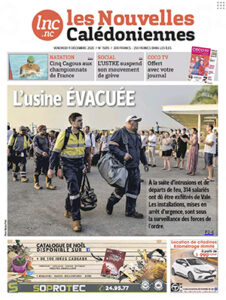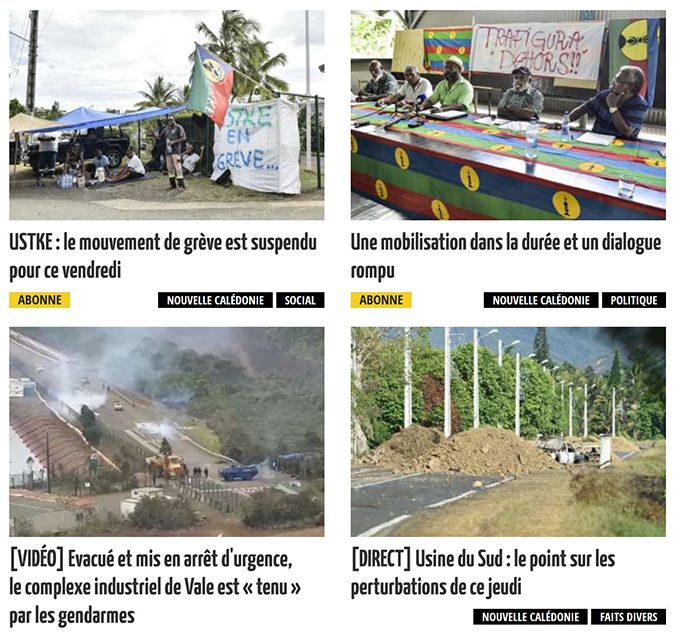
BACKGROUNDER: By Michael Field
Efforts by Brazilian miner Vale SA to extract itself from one of the world’s largest nickel and cobalt operations are creating deeping tensions and confusion in the French Pacific territory of New Caledonia.
On Wednesday night Vale announced a vague deal, without disclosing full financials, but by Thursday there was uncertainty as Paris officials entered a political maze around it all.
Violence broke out this week in the capital Noumea with indigenous pro-independence groups trying to take control of the mining as small bands of white settlers, some armed, supported Vale’s exit plans.
- READ MORE: Vale mine evacuated as confrontation looms
- Intruders seize machinery, authorities halt international flights
It comes soon after New Caledonia, population 286,000, held a second referendum on independence in October, narrowly voting to retain French control.
A third referendum in 2022 may yet be held.
Indigenous “Kanaks” account for 39 percent of the population.
New Caledonia has around a quarter of the world’s known nickel reserves.
Conrontation over nickel
The current confrontation involves the Goro Nickel Project, 60 km east of Noumea which commenced production in 2010 planning to produce 60,000 tonnes a year of nickel and up to 5000 tonnes of cobalt.
It has 55 million tonnes of estimated measured and indicated mineral reserves.
Vale obtained the rights as part of a 2007 US$19 billion takeover of Canadian company Inco. But it ran several years behind creating the project, worth over US$6 billion.
Start up decisions left an operation only producing around a third of its promised annual capacity. Using a difficult technology to convert ore to nickel oxides, Vale has been unable to produce preferential battery material nickel sulfate.
Nickel production at the Goro mine reached its peak 37,400 tonnes in 2017. The mine was expected to produce 31,000 tonnes this year in 2020.

The Goro project, which includes open cast mining, refining and a port, has been 95 percent owned by Vale Nouvelle-Calédonie with the balance held by the local government.
Vale’s plant is the second-largest employer in the Southern Province, with some 3500 employees and contractors.
Vale trying to get out
Vale has been attempting to get out, to the extent of simply closing the operation and walking away.
Earlier this year Australian-based zinc producer New Century said it was seeking a deal to buy but backed out after failing to raise enough cash.

Indigenous groups sought to promote a bid from Sofinor, the financial arm of New Caledonia’s Kanak-run and majority population Northern Province and its partner Korea Zinc.
While Vale had rejected the offer, it stayed political live until last week when, as violence escalated, Korea Zinc pulled out.
University of New Caledonia law professor Dr Mathias Chauchat said the situation was a mess with five areas of concern. These included a difference in treatment between how the Prony and Sofinor bids were treated and possible conflicts of interest among directors of Vale New Caledonia.
There is also “the ecological risk of a residue dam, like in Brazil”. There was also concern over the move away from exporting finished goods and the question of whether in changed New Caledonia there was to be public sector development, or not.
In early December Vale said they would only negotiate with a new group, Prony Resources, named after the local port. Prony is led by Vale’s current New Caledonia management and employees, supported by New Caledonian and French authorities.
Singaporean group
Twenty five percent of Prony’s shares are held by Trafigura Group, a Singaporean multinational commodity trading company.
On Thursday Vale said it had a “binding put option” to formalise the sale to Prony Resources. It said the new structure offered “significant domestic participation and that takes into account the aims of social and environmental responsibility….”
It would continue long standing commitments to maintain benefits for the indigenous people of New Caledonia’s Southern Province.
“All parties to this negotiation have invested a significant amount of time and effort to reach a solution for the sustainable future of (Vale),” said Mark Travers, Vale’s executive director of Base Metals.
“Vale and everyone involved in the divestment process – including the South Province of New Caledonia, the French State and (Vale) employees and management – can be proud of the fact that those efforts have yielded such a positive result.”
As a result of the deal Vale said they expect it completed by the first quarter of next year and that “a reserve of US$500 million will be reflected on Vale’s consolidated financial statements.”
The deal remains subject to the approval of New Caledonian authorities and the French state.
Noumea at a standstill
But as the maneuvering continued this month Noumea has come to much of a standstill in the wake of demonstrations and roadblocks. Mines, shops, the port and several major roads to Goro have been blocked.
The main independence group, the Kanak Socialist National Liberation Front (Front de Libération Nationale Kanake et Socialiste; FLNKS) say their fight over Goro “is a fight against multinationals who try to loot the wealth of all New Caledonians and pollute our country”.
They want the indigenous to be majority owners.
FLNKS, which controls Northern Province, has especially objected to Trafigura, saying it amounts to “plundering of the country’s resources by multinationals”.
Europe-based public affairs consultant Sebastien Goulard, a specialist on European Union-China relations and New Caledonia said the local people did not want Trafigura, because of questions over its role in possible environmental damage.
He said the Vale-favoured deal gives more power to the French loyalists in the Southern Province, meaning the FLNKS would not be able to control the southern mine and the jobs that the mine provides.
“It is not only about economics,” he said, “and that’s why it is so difficult to conduct business in New Caledonia.”
Industrial strategy
Another point was the industrial strategy presented by Trafigura.
“Trafigura would continue the recent strategy adopted by Vale: that is to say the production of NHC (nickel hydroxyde cake), and nickel saprolite type ore to be exported to China (and Finland, if Trafigura’s option is chosen).”
Goulard asked whether it was really possible to refine nickel in New Caledonia in a competitive way.
“The pro-independence supporters prefer to keep control over the island’s main economic sectors,” he said.
“But is it really the best choice when you want to be independent and you will need bigger foreign investment in the coming years? The current crisis gives a terrible image of New Caledonia to possible foreign investors.”
Michael Field, who writes for Nikkei Asia, has provided this article for Asia Pacific Report.













































Not the whole story. One of the main players – Ralph Mapou – has pressing financial (and possibly legal) reasons for not accepting the Trafigura deal.
See
Vale et les juteux “intérêts-pays” de Monsieur Mapou
https://caledosphere.com/2020/12/10/vale-et-les-juteux-interets-pays-de-monsieur-mapou/
NB. While the Caledosphere website is anti-independence, the facts it relays are usually reliable
Comments are closed.